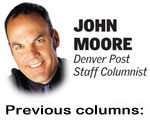
Denver Post theater critic John Moore raises questions about the ethical responsibility to portray truth on stage and the fuzzy boundary between fact and fictionalized drama.
Most film audiences are familiar with the phrase, “Based on a true story,” or the even looser attribution, “Based on true events.” They understand that what they see on screen is a fictionalized version of people, places, and events that, in some form, really exist. But they’re also savvy enough to understand that reality has been rewritten and rearranged to make it more interesting.
Denver Post theater critic John Moore raises questions about the ethical responsibility when attempts are made to portray truth (even partial truth) on stage and the fuzzy boundary between fact and fictionalized drama.
Docudrama works of theater, like the Tectonic Theater Company’s 2000 play “The Laramie Project,” present a different relationship to reality. The play tells the story of Matthew Shepard’s 1998 murder, which garnered national attention both because of the brutal nature of his killing and the fact that many believed it to be a hate-crime, with Shepard targeted because he was gay. To create the script, members of the theater company traveled to Laramie, Wyoming and conducted interviews with Shepard’s friends, family, and the local residents. On stage, the actors play themselves, reading portions of personal diary entries about the company’s experience in Laramie, as well as the real people with whom they conducted interviews. Ostensibly, these types of “non-fiction” works are based on facts. But the actors and directors who create such works, like the screenwriters and directors of based-on-a-true-story movies, also maintain artistic license to rewrite and rearrange.
Last week, the Tectonic Theater Company’s 90-minute epilogue, called “The Laramie Project: 10 Years Later,” simultaneously premiered at 150 theaters around the world, performed by over 1,000 actors. Like the original script, the epilogue was built out of material obtained through interviews with Laramie residents.
In particular, Moore — who played a role in the University of Denver production of the epilogue — has concerns about the company’s interviews with Matthew Shepard’s killers, the first interviews granted since 2004. Actor Greg Pierotti spoke with Aaron McKinney over the course of three separate interviews at Wallens Ridge State Prison in Big Stone Gap, VA., where McKinney is serving his two consecutive life sentences. According to the Associated Press, which picked up the story about Pierotti’s interview with McKinney because it revealed new sentiments from Shepard’s killer, each of those three interviews lasted more than three hours during which Pierotti wasn’t allowed to use a tape recorder.
On stage, those interviews are condensed and edited down to about 10 minutes. Moore writes, “…while we take it on faith that McKinney said every word that comes out of his mouth on stage, they didn’t come out in quite the same way that Pierotti wrote them — and Tectonic has never claimed otherwise.”
Furthermore, Moore asserts that if Pierroti and Stephen Belber, the Tectonic member who interviewed McKinney’s accomplice, Russell Henderson, had been journalists, they probably would not have been granted the interviews at all. Belber responded, explaining the advantages of being an actor/writer rather than a journalist. “I feel like we have tried consistently to go beyond what journalists are capable of doing,” Belber told Moore. “Journalists provide an incredibly important service, but they don’t have the luxury we do of returning six times over the course of a year to really track emotions and thoughts over that kind of time.
“I feel like the theatrical niche of ‘docudrama’ is pretty valuable, because artists can get in there in a deeper way. There’s a humanizing quality that we are after as artists that allows us to gain their trust.”
But this is precisely what makes this type of work such an ethical quagmire. It’s safe to assume that McKinney and Henderson understood that these actors would use their conversations as material for a stage production. But did they understand the great magnitude of the production — as Moore writes, “‘The Laramie Project’ is believed to be the most-produced play of the past decade.” — and how many people around the world would hear their words? Did they think about the fact that their words would be reported in news sources, like the Associated Press? And did they realize the extent to which their interviewers might take liberties with their words?
A journalist may edit and condense, but only in service of conveying the truth. A playwright or dramatist serves a different agenda. “While the goal of any journalist is to produce a balanced and accurate news report,” writes Moore,”The goal of a playwright is to create an emotionally complex and compelling piece of theater that might galvanize audiences to action, understanding or acceptance.” He wonders whether audiences are able to distinguish between the two disciplines, especially in cases like “The Laramie Project.”






Comments Terms and Conditions